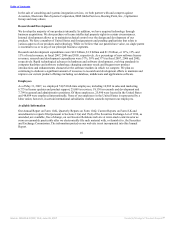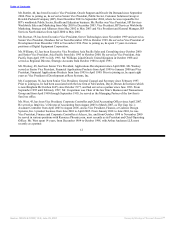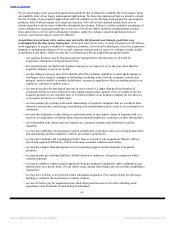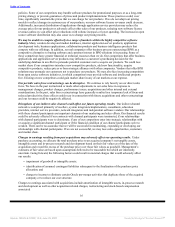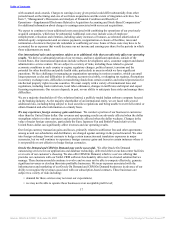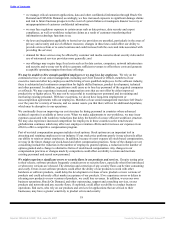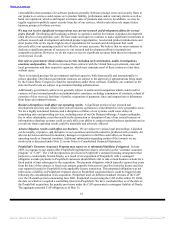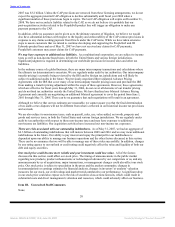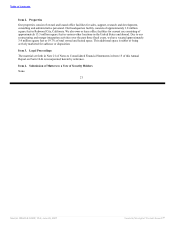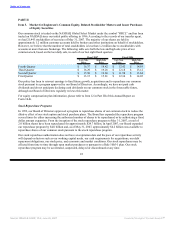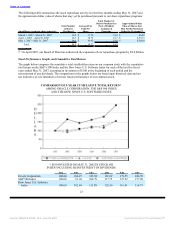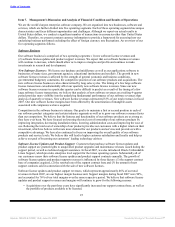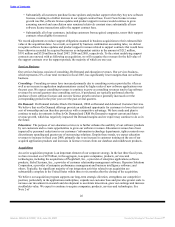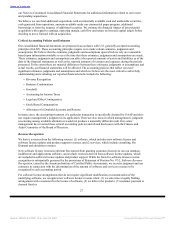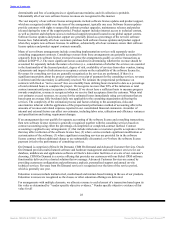Oracle 2006 Annual Report Download - page 22
Download and view the complete annual report
Please find page 22 of the 2006 Oracle annual report below. You can navigate through the pages in the report by either clicking on the pages listed below, or by using the keyword search tool below to find specific information within the annual report.
Table of Contents
• we manage critical customer applications, data and other confidential information through Oracle On
Demand and CRM On Demand; accordingly, we face increased exposure to significant damage claims
and risk to future business prospects in the event of system failures or inadequate disaster recovery or
misappropriation of customer confidential information;
• we may face regulatory exposure in certain areas such as data privacy, data security and export
compliance, as well as workforce reduction claims as a result of customers transferring their
information technology functions to us;
• the laws and regulations applicable to hosted service providers are unsettled, particularly in the areas of
privacy and security and use of offshore resources; changes in these laws could affect our ability to
provide services from or to some locations and could increase both the costs and risks associated with
providing the services;
• demand for these services may be affected by customer and media concerns about security risks and/or
use of outsourced services providers more generally; and
• our offerings may require large fixed costs such as for data centers, computers, network infrastructure
and security and we may not be able to generate sufficient revenues to offset these costs and generate
acceptable operating margins from these offerings.
We may be unable to hire enough qualified employees or we may lose key employees. We rely on the
continued service of our senior management, including our Chief Executive Officer, members of our
executive team and other key employees and the hiring of new qualified employees. In the software industry,
there is substantial and continuous competition for highly skilled business, product development, technical
and other personnel. In addition, acquisitions could cause us to lose key personnel of the acquired companies
or at Oracle. We may experience increased compensation costs that are not offset by either improved
productivity or higher prices. We may not be successful in recruiting new personnel and in retaining and
motivating existing personnel. With rare exceptions, we do not have long-term employment or
non-competition agreements with our employees. Members of our senior management team have left Oracle
over the years for a variety of reasons, and we cannot assure you that there will not be additional departures,
which may be disruptive to our operations.
We continually focus on improving our cost structure by hiring personnel in countries where advanced
technical expertise is available at lower costs. When we make adjustments to our workforce, we may incur
expenses associated with workforce reductions that delay the benefit of a more efficient workforce structure.
We may also experience increased competition for employees in these countries as the trend toward
globalization continues which may affect our employee retention efforts and/or increase our expenses in an
effort to offer a competitive compensation program.
Part of our total compensation program includes stock options. Stock options are an important tool in
attracting and retaining employees in our industry. If our stock price performs poorly it may adversely affect
our ability to retain or attract employees. In addition, because we now expense all stock-based compensation,
we may in the future change our stock-based and other compensation practices. Some of the changes we are
considering include the reduction in the number of employees granted options, a reduction in the number of
options granted and a change to alternative forms of stock-based compensation. Any changes in our
compensation practices or changes made by competitors could affect our ability to retain and motivate
existing personnel and recruit new personnel.
We might experience significant errors or security flaws in our products and services. Despite testing prior
to their release, software products frequently contain errors or security flaws, especially when first introduced
or when new versions are released. The detection and correction of any security flaws can be time consuming
and costly. Errors in our software products could affect the ability of our products to work with other
hardware or software products, could delay the development or release of new products or new versions of
products and could adversely affect market acceptance of our products. If we experience errors or delays in
releasing new products or new versions of products, we could lose revenues. In addition, we run our own
business operations, Oracle On Demand, and other outsourcing, support and consulting services, on our
products and networks and any security flaws, if exploited, could affect our ability to conduct business
operations. End users, who rely on our products and services for applications that are critical to their
businesses, may have a greater sensitivity to product errors and security
18
Source: ORACLE CORP, 10-K, June 29, 2007 Powered by Morningstar® Document Research℠




